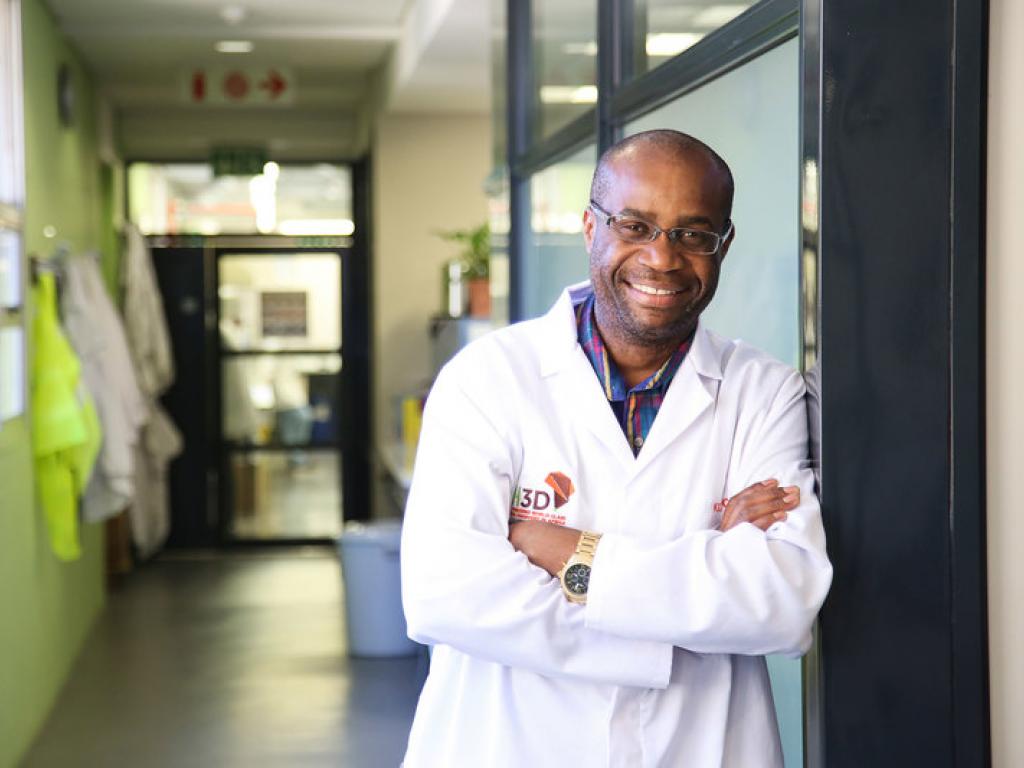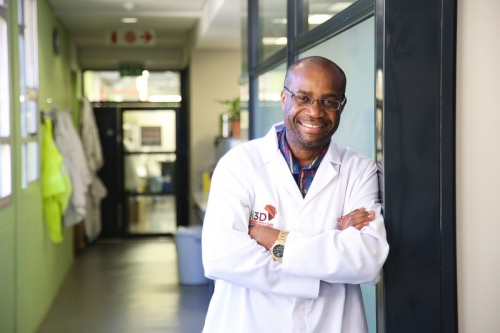UCT drug discovery trailblazer among Juneteenth biotech leaders


Prof Kelly Chibale is the only Africa-based scientist among top black biotech leaders featured in the Timmerman Report’s Juneteenth list.
Professor Kelly Chibale, the founder and director of the University of Cape Town’s (UCT) Drug Discovery and Development Centre (H3D), has been named among 22 rising black biotech leaders in the Timmerman Report, published in the United States (US). Professor Chibale is the only Africaâbased scientist included in the group.
The list was published to honour innovative black biotech leaders who are changemakers in their fields. Its publication marked Juneteenth (sometimes called Black Independence Day) on 19 June, a US federal holiday commemorating the emancipation of AfricanâAmerican slaves in 1863.
Chibale has received worldwide recognition for his work. In 2018, Fortune magazine named him one of the World’s 50 Greatest Leaders. The UCT National Research Foundation Aârated researcher said he was honoured by the latest acknowledgement.
“As a hardcore natural scientist and entrepreneur, I believe in the power of science to transform lives and create jobs,” he said. “Encouraging, supporting and incentivising scientific entrepreneurship will help move the continent of Africa forward.”
“I believe in the power of science to transform lives and create jobs.”
The listing also affirms Chibale’s vision to seed an innovative pharmaceutical research and development (R&D) industry in Africa.
“I am relentless when it comes to pursuing this vision. For our work and lab, it shows [that] what we do collectively is worldâclass.”
Chibale said he hopes it will inspire and encourage other black researchers to use the disadvantage they feel and/or experience on the basis of their race as an advantage. Despite the “real boundaries” to black scientists, one has to make a personal choice, he said.
“I choose to focus on doing what depends on me to do, while being grateful for any opportunity I am given. The beauty of freedom in academia and independent research is that no one can stop me from thinking or coming up with research ideas and attracting funding from anywhere in the world to push my research ideas.
“I choose to use any boundaries, along with a deep sense of responsibility and gratitude, as a source of motivation, to be an inspirational role model for sustained worldâclass performance and excellence,” he said.
Build locally
Chibale said that youth from various ethnic, social and economic backgrounds need “inspirational role models who stand for worldâclass excellence in whatever they do, including in leadership and politics”.
The fact that he is the only Africaâbased researcher on the list was significant in this regard.
“It’s a big deal for me and UCT to be singled out in the US – arguably the biotech hub of the world. It is very special. The consistently worldâclass work my team does has put UCT, South Africa and Africa on the world map in drug discovery. The world has taken notice of what is coming out of Africa! To quote the Roman philosopher Pliny the Elder (23/24-79 CE), Ex Africa semper aliquid novi, or ‘Out of Africa, there is always something new’.”
“Africa needs science, not aid, to contribute to sustainable economic growth and tackle health challenges such as those posed by COVID-19.”
There are three key aspects to this, he added.
“First, Africa needs science, not aid, to contribute to sustainable economic growth and tackle health challenges such as those posed by COVIDâ19. Africa needs to develop and/or strengthen her capacity to use science for the benefit of all who live on the continent. Second, there is a need for us Africans to contribute solutions to unmet medical needs and drive job creation. Third, the emergence of COVIDâ19 has reinforced the need to build locally.”
African biotech for the future
COVIDâ19 has also illuminated the need for ‘homegrown’ biotech skills, especially in vaccine and therapeutics development – and the development of new drugs to treat malaria, tuberculosis and HIV, which are still rife on the continent.
“To provide sustainable health innovation solutions and prepare for future pandemics, we in Africa need to accelerate and scale up investments in health systems as well as health innovation in terms of R&D, so we can one day produce our own vaccines and therapeutics – just like countries like China are currently doing.
“This is so that in future we don’t need to advocate for vaccine equity. Health innovation requires a critical mass of ‘homegrown’ skills. But one of the most difficult conundrums towards a critical mass of ‘homegrown’ skills is how to create an absorptive capacity to identify, attract, develop and retain talent.”
Chibale said that to do this sustainably and at scale will require strong partnerships.
“These involve universities (who train people for work, generate knowledge or research outputs, and explore applied research problems), business (who need the skills for their workforce and look for solutions, which universities have the capacity to explore through research), and government (whose job is to create and regulate the environment in which economic activity takes place).
“But we must never underestimate small beginnings. We must start from somewhere. I hold H3D as evidence of this.”
“We must focus on highlighting and investing in those already on the continent.”
Chibale called for “a deliberate and intentional strategy to proactively seek out, identify and build on existing pockets of excellence, so that they are supported to succeed rather than to survive”.
“This strategy, once implemented, could provide lowâhanging fruits to demonstrate rapid success and increase the likelihood of providing the muchâneeded absorptive capacity to identify, attract, develop and retain a critical mass of skilled scientists in Africa, including attracting those in the diaspora to either return or contribute from abroad.
“We need to encourage, support and incentivise scientific entrepreneurship so we can create science jobs – rather than just rely on government, which is dealing with other potentially more pressing needs.”
Story: Helen Swingler
Photo: Je'nine May
